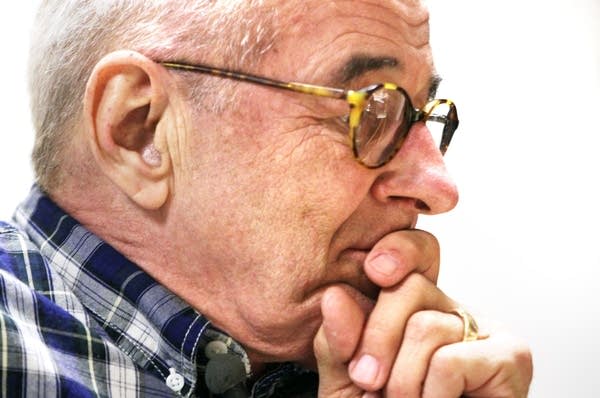Professor with terminal cancer uses illness to teach

Update from Monte Bute in December 2011:
"I have been in remission for 10 months. While I appreciate this hiatus, I am also somewhat ambivalent. Remission from terminal cancer is, by definition, a temporary reprieve. I had made my peace with death, when suddenly I was expelled from the land of the dying. It is not easy to return to the land of the living and, once again, play an active role in the human comedy ... But perhaps that is the point: none of us have anything more than a temporary reprieve from our terminal condition."
St. Paul, Minn. — College professors know using personal experiences in their lectures can be an effective way to drive a point home.
With that in mind, Monte Bute, a sociology professor at Metropolitan State University in St. Paul, is sharing one of the toughest struggles imaginable with his students.
Create a More Connected Minnesota
MPR News is your trusted resource for the news you need. With your support, MPR News brings accessible, courageous journalism and authentic conversation to everyone - free of paywalls and barriers. Your gift makes a difference.
"I've had the most extraordinary life. I have experienced so much. I have no regrets," Bute said. "No, I didn't miss anything on this trip,"
Bute has terminal cancer, and he' been using his personal perspective to enlighten students on the process of death and dying in a class called Life of the Mind.

Students in this master's level course dive into philosophy, medieval history and literature.
In a recent evening class, they watched the film "The Seventh Seal," by Swedish director Ingmar Bergman.
"Anytime I feel very Lutheran and tortured I try to watch it," he said.
In the film, Death, portrayed as an ashen faced man wearing a black cloak, has come to take the life of a knight. The knight challenges Death to a chess match. Death agrees, but says if he wins, the knight dies.
It's one of Bute's favorite films, and at another time he might have used it to prompt an abstract academic discussion. But now, he said, it carries potent symbolism that feels very real.
"Death showed up at my door on my birthday last year and I've been playing him a game of chess. I may win or lose," he said, "but I'm willing to keep taking it on. If I win I live. If I lose he takes me."
Bute was diagnosed with a rare and terminal cancer 12 months ago. The median survival rate for the illness is 14 months.
His cancer is in remission now, but Bute said this type of cancer can come roaring back more aggressively. He said he'll be happy if he's gained another six months of life from his treatments.
Bute's diagnosis went public when colleagues and students formed the Monte Bute Fan Club on Facebook. To date, there are more than 300 members in the group.
"What would probably have been a much more private experience, suddenly thrust me into public view," Bute said.
That's when Bute decided to talk about his illness in the classroom. He said his theme for teaching over the last year has been "Dying in Class: Bringing Sociology to Life".
"Something just clicked with me being a teacher. This is a teachable moment," Bute said. "Americans are so into denial about death and dying that I can use this, and along with sharing my own quest, for some understanding and wisdom out of this process."
Tom O'Connell has watched Bute use his diagnosis to bring personal experience to the subject of death and dying. O'Connell teaches political studies at Metropolitan State.
"We all teach the social sciences and the key idea is trying to get our students to see themselves as connected with other people and other social realities," O'Connell said. "To do that in a subject, any subject, but something like death, is a real gift, and he's been able to pull it off."
In plain view of his students, Bute has at times struggled through his illness and its treatment.
Natalie Baumgartener, 20, a social science major from Coon Rapids, took Bute's class in social theory last fall.
Baumgartener said Bute never stopped teaching, even though some days chemotherapy left him so weak he could barely drag himself to class. His determination kept students on track, she said.
"Because what can you say to a terminal cancer patient, 'I don't feel well today'? He doesn't feel well everyday," Baumgartener said. "Most of us had a really hard time skipping class because clearly this person is in much more pain than we are, the least we can do is show up."
The first thing you notice about Bute these days is just how upbeat he is, how full of life he seems. He said he isn't a man who's resigned to dying, but he's also not ignoring what he calls his "death sentence."
And teaching, even now, he said, is what keeps him going.
"Your illness and your aches and pains fall away," he said. "There's something happening in that space between you and students that's magical, that's mystical, that's profound and it just sucks you in completely."
Monte Bute said he's going to keep teaching as long as he can. He doesn't know how long that might be, but said he's not leaving the classroom until they have to carry him out.


